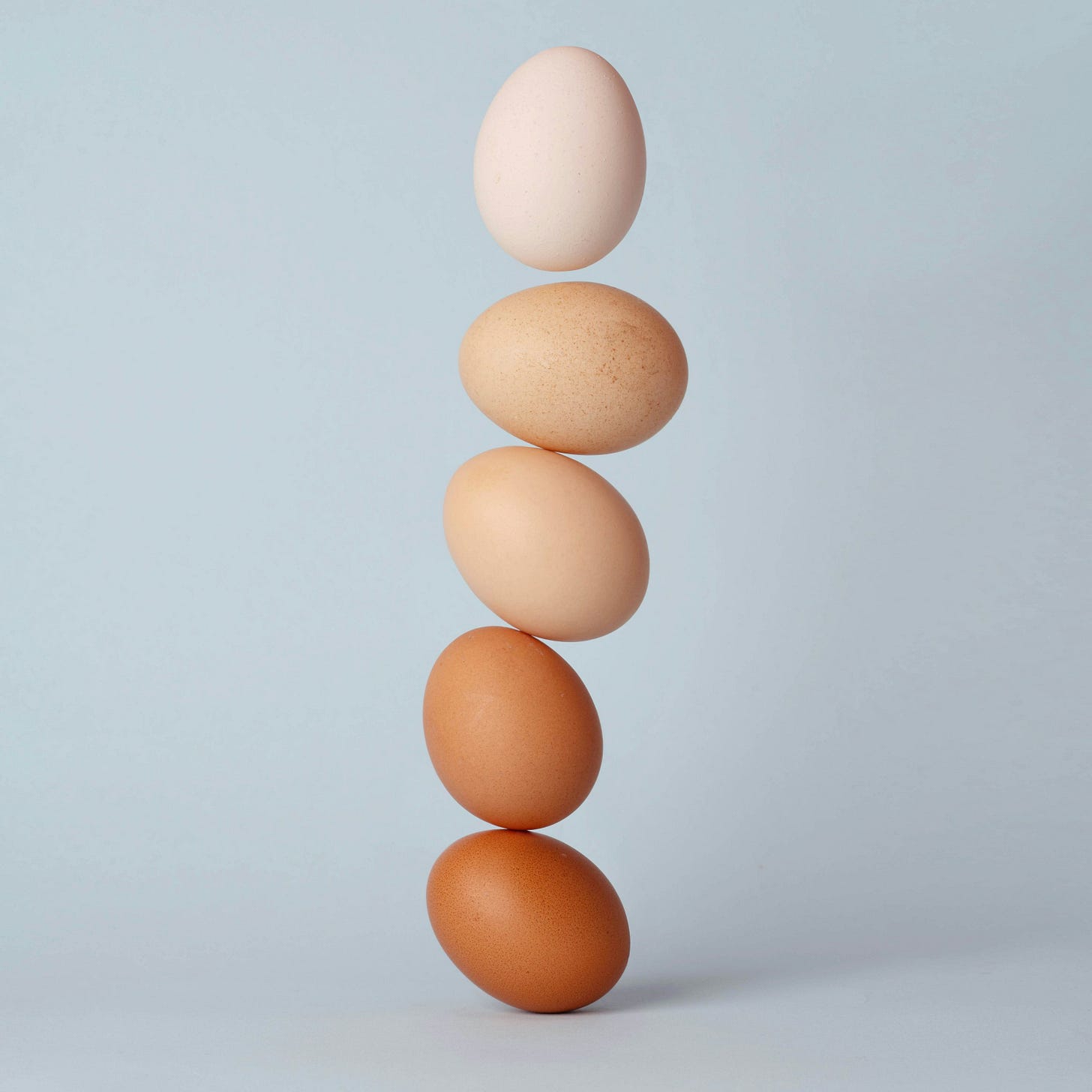Why we need to keep imagining good
A story of eggs and hope
The other day my neighbor and I got talking about how politics lately seems designed according to all the worst in humanity—selfishness, impatience, and fear. Maybe we’ve consented to building the world according to our worst selves. We’ve forgotten how to imagine and build a better world.
As we were spiraling into that woe-is-us conversation, I remembered a story about eggs. I’d like to tell you that story because it offers a reminder of how to keep imagining good even when it’s not happening.
About a decade ago, an economic anthropologist named Edward Fischer got thinking about eggs in Germany. Every egg sold in Germany is marked as organic, cage-free, or neither of these. And the price differences between these categories are consistent. You can easily look up national sales data and see how much people are willing to pay extra for eggs that benefit the common good.
But here’s what Fischer wondered—do people’s actual egg purchasing habits match what they intend to purchase?
Fischer and his team stood outside grocery stores asking people whether they planned to purchase premium eggs. And sure enough, shoppers claimed to be purchasing a lot of happy-chicken eggs. But when the researchers compared what people said they would purchase to national stats on actual purchases, they found a signicant difference. Sixty percentof people self-reported planning to purchase organic or free range eggs. National sales figures revealed that only 30%—half as many—actually do.
Which number matters? The 60% who plan to do something for the common good, or the 30% who put their money where their mouth is? Are those 30% who don’t do what they intend just self-deceptive liars and hypocrites? (I’ll tell you what, I’m often in that camp.)
The difference between the 30% and 60% here is a difference between what social scientists call revealed preferences (the things people actually do) and stated preferences (the things people claim to want). Revealed preferences tend to be easier to measure—you can count the number of eggs people purchased. But ease of measurement doesn’t necessarily mean a variable tells us what we need. Revealed preferences tell us how the world currently works. Stated preferences tell us how we hope.
As I’ve researched the ways people become long-term advocates for racial justice, I’ve become convinced that we desperately need both numbers. We need to take a hard look at the world as it is, not sugar-coating or pretending it’s going to be easy to fix. There’s no real hope in denial.
But we also need to hold a vision of the world we want. We need to ask people what they hope for, research it, analyze it, and treat those hopes as real data. We need to become leaders and influencers and voters who can hold our very best vision of society before us.
Here's what Fischer says about stated preferences:
“We should also take seriously what people say they want; people’s stated preferences reveal equally valid desires and are often attuned to long-range and prosocial values.” Stated preferences help us understand people’s “values and ideals, hopes and dreams for the future, the sort of person they want to be, and the sort of world they want to live in. This tells us a lot not only about the way things are, but also about the way things could be.”
Knowing our stated preferences is a first step toward making them a reality. Studies by psychologists and behavioral economists show that people tend to overvalue gains for ourselves and undervalue gains enjoyed by others, including our own future selves. We prioritize short term rewards over long term. It’s called hyperbolic discounting, and it’s what I did today when I chose to sleep in instead of exercising. We overvalue
But social scientists also find that minor tweaks in systems can nudge people toward their stated preferences. A grocer who knows that 60% of people walk into grocery stores intending to buy premium eggs could choose to place premium eggs at eye level or nearer the checkout. You’ve got to put eggs somewhere, so why not arrange them in a way that helps people make a better choice?
We have to be honest about the way the world is, share a vision of a better world, and make changes to bring it to reality. That’s what keeps me motivated as a professor lately. Around the time I was finishing my PhD, an anthropologist named Joel Robbins made waves across anthropology by pointing out that anthropologists spend most of their energy writing about bad things. He made a bold recommendation—why not spend some more time writing about anthropology of the good?
My book Racial Justice for the Long Haul is anthropology of the good. I’m also very honest about the bad. But I believe we also need to gather up glimpses of the good, rigorously study what we hope for, and join in making it happen.
What good are you hoping for lately? Who around you shares that hope? What could you do today to nudge it into reality?
This article is part of series on proven, effective ways to pursue justice for the long haul. We’re going to need perseverance, strategy, accomplices, humility, tears, and a lot of other things. That’s why I decided to call this series “What we still need.” Read more posts in this series here. If you like what you’re finding here, please tell a friend!


